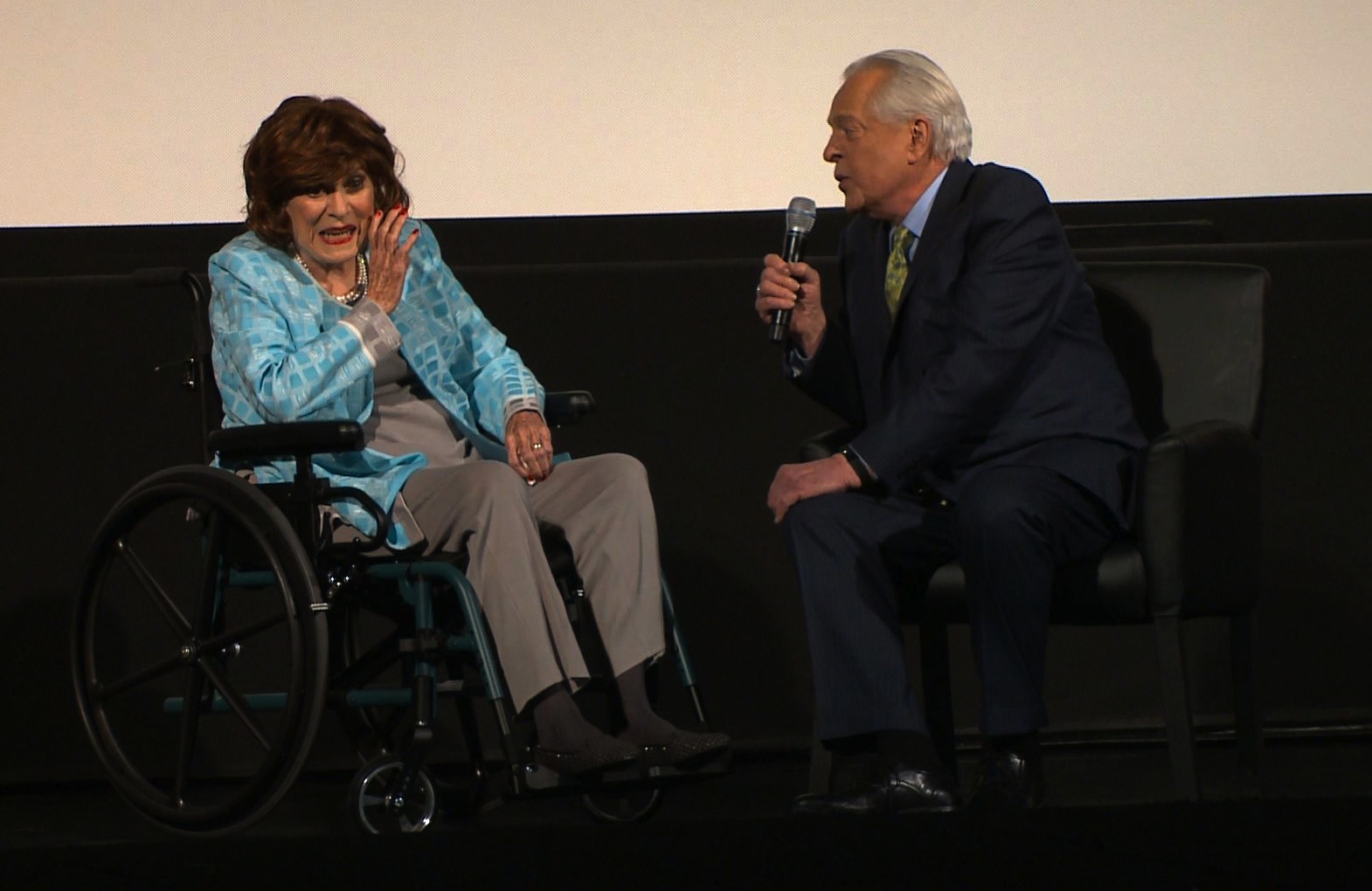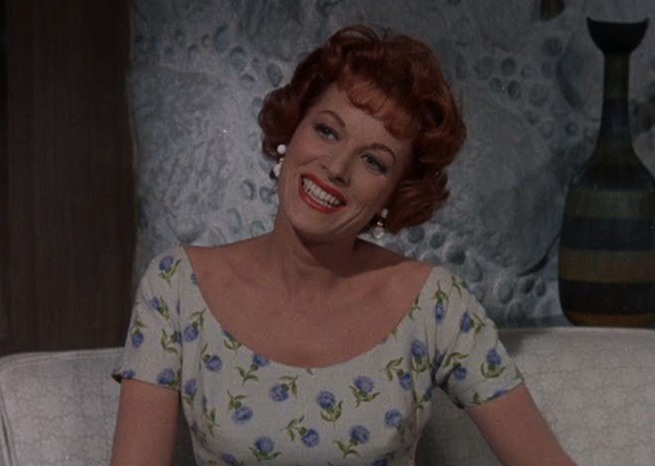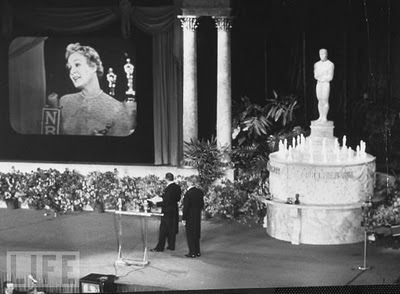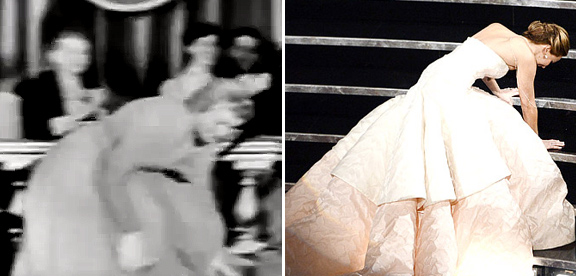 Michael C here to introduce my new column: Burning Questions. Every week I will tackle an issue of pressing importance to film lovers the world over - or I'll just let fly with whatevers on my mind when I sit down at the laptop. Either way, I'm jazzed to get started. First up, the question of the "career honors" Oscar win.
Michael C here to introduce my new column: Burning Questions. Every week I will tackle an issue of pressing importance to film lovers the world over - or I'll just let fly with whatevers on my mind when I sit down at the laptop. Either way, I'm jazzed to get started. First up, the question of the "career honors" Oscar win.
One of my most vivid memories as a young Oscar viewer is the '97 race when Juliette Binoche beat out Lauren Bacall’s heavily-favored performance in The Mirror Has Two Faces. The press had declared Bacall a mortal lock. Not only was she Hollywood royalty, she was overdue Hollywood royalty. Should've been nominated for To Have and Have Not, The Big Sleep and a half dozen others, so forget everything else and bet the farm on the former Mrs. Bogart. The unmistakable shock on both her and Juliette’s face when the envelope was opened suggests they had read the same coverage I had. It turns out that when voters were presented with the privacy of their ballots, Bacall's history of snubs proved no match for a strong performance in a popular film.
Yet despite this, every year we still get prognosticators writing about this or that star's overdue status as if it were a simple bank transaction, collect enough overdue points and trade it in for a shiny new trophy. This year the race is crowded such names. From Christopher Plummer with his career stretching back to Sound of Music, to the equally legendary Max Von Sydow, to five-time runner up Glenn Close, Albert Brooks, Nick Nolte, and the still never nominated Gary Oldman. With so much delayed Oscar justice poised to be dealt out it begs the question:

How much is “overdue” status really worth?
Of course, it's impossible to pin down the murky motives of Oscar voters with much certainty since the Academy doesn’t conduct an exit poll (Now there’s a thought). People often attribute Henry Fonda’s win for On Golden Pond to career honors, to name one example, but I think it had more to do with the fact that his was the strongest nominated performance and it was from one of the year’s most popular films. I think it’s safe to assume even if he had he won for Grapes of Wrath way back in the day, his performance in Pond would have gone home with the trophy anyway.
 To be fair, there are more cut and dry examples. One could make a strong case for John Wayne’s and Paul Newman’s Oscars being as much about career achievement as the winning performances. But even if that were true, it still shows the limits of such sentiments. Both triumphed over relatively weak, or in the Duke’s case divided, competition. If Wayne’s True Grit had come out a year later and gone up against George C. Scott’s Patton, all the overdue standing in the world would not have brought him a victory.
To be fair, there are more cut and dry examples. One could make a strong case for John Wayne’s and Paul Newman’s Oscars being as much about career achievement as the winning performances. But even if that were true, it still shows the limits of such sentiments. Both triumphed over relatively weak, or in the Duke’s case divided, competition. If Wayne’s True Grit had come out a year later and gone up against George C. Scott’s Patton, all the overdue standing in the world would not have brought him a victory.
On the other hand, the list of superstars who missed in their last stabs at Oscar glory is long indeed. The wildly overdue Richard Burton lost for the seventh and final time to the youngest Best Actor winner ever up to that time, Richard Dreyfuss. Both Judy Garland and Monty Clift received their last career nominations for Judgment at Nuremberg and both were pushed aside to make way for the fresh-faced stars of West Side Story. The urge to hand Fred Astaire his first and only nod at age 75 was good enough to see him nominated for tripe like Towering Inferno, but all that good will went out the window when he went up against the young DeNiro’s take on Vito Corleone.
And let us not forget Peter O'Toole, the patron saint of Oscar also-rans, who set the all-time record for nominations without a win in '06 when he received his eighth Best Actor nod for Venus. And what did all that accumulated good will buy him? A front row seat to witness the Forest Whitaker juggernaut cruise to victory - on his first nomination, no less.

So for all the importance placed on it I think it’s fair to say “overdue” status is over-valued. It’s a bump. A nudge. A tie-breaker. Did it help Alan Arkin eke out a win over Eddie Murphy? Probably. Will it be good enough for Glenn Close to beat this year’s stiff Best Actress competition if Albert Nobbs' reception remains lukewarm? Doubtful. In the final tally, the greatest benefit of overdue status lies less in garnering votes and more in garnering buzz, bringing attention to performances that are worthy on their own merit. All the career honors chatter is great for winning Beginners viewers, but when the ballots go out better for people to remember how terrific Plummer is this year than to think back on how badly he was snubbed for The Insider.
Any other questions you want me to tackle? Let me know in the comments. You can follow Michael C. on Twitter at @SeriousFilm
 Thursday, April 17, 2014 at 10:00AM
Thursday, April 17, 2014 at 10:00AM  Maureen O'Hara introducing "How Green Was My Valley" at TCM 2014
Maureen O'Hara introducing "How Green Was My Valley" at TCM 2014












